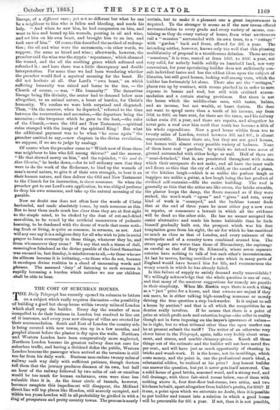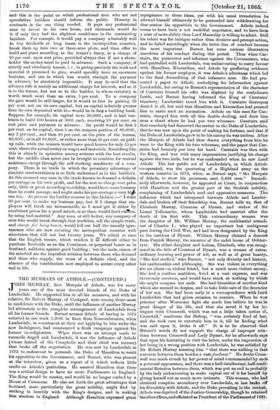THE COST OF SUBURI3AN HOUSES.
THE Daily Telegraph has recently opened its columns to letters On a subject which really requires discussion—the possibility of building a good but cheap house within twenty miles of London -which shall repay the builder. Every day the number of men compelled to do their business in London but resolved to live out .of it increases, and every year new clumps of villas are erected for their accommodation. South and East of London the country side is being covered with new towns, run up in a few months, and peopled almost before the plaster is dry upon the walls. Northern and Western London have been comparatively more neglected, Northern London because its greatest railway does not care for suburban traffic, and having a dividend defies the public, Western London because the passenger when arrived at the terminus is still too far from his daily work. Business men endure twenty miles of railway each way daily with sufficient patience, though doctors tell them that the journey produces diseases of its own, but half an hour of the railway followed by two miles of cab or omnibus would be too much for human endurance, even were time less valuable than it is. As the inner circle of tunnels, however, becomes complete this impediment will disappear, the Midland direct line will tap places like Hendon, still scarcely occupied, and within ten years London will in all probability be girdled in with a ring of prosperous and pretty country towns. The process is nearly
certain, but to make it a pleasant one a great improvement is required. To the stranger it seems as if the new towns offered accommodation to every grade and every variety of means, con- taining as they do every variety of house, from what auctioneers call a " mansion " surrounded with its own trees, to a " cottage " with "garden" back and front, offered for 30/. a year. The intending settler, however, knows only too well that this pleasing multiformity of proposal is a troublesome delusion. There are the "mansions," it is true, rented at from 1601. to 3001. a year, not very solid, for nobody builds solidly on leasehold land, nor vary convenient, for your speculating builder does not sufficiently con- sult individual tastes and has the oddest ideas upon the subject of libraries, but still good houses, looking well among trees, which the builder has fortunately let alone. There also are the " cottages," places run up by contract, with rooms pinched in in order to save expense in beams and roof, but still with civilized accom- modation and a certain' staring prettiness. But there is not the house which the middle-class man, with tastes, babies, and an income, but not wealth, at heart desires. He does not want to speqd more than a tenth of his income, say from 5001. to 8001. on bare rent, for there are the taxes, and his railway ticket costs 201. a year, and there are repairs, and altogether he never gets a roof over him until that tenth has become a fifth of his whole expenditure. Now a good house within from ten to twenty miles of London, rented between 501. and 801., is almost unprocurable. Houses there are, but they are not good houses, but houses with almost every possible variety of badness. None of them have real "gardens," by which we intend two acres of ground surrounded with either hedge or wall. Half of them are " semi-detached," that is, are penetrated throughout with noises which their occupants do not make, and all have the inner walls and floors so thin that the cry of a child, or the sound of a piano, or the kitchen laugh—which is as unlike the parlour laugh as bagpipes are unlike a guitar, a low laugh being the last product of civilized self-restraint—fills the entire building. The roof is generally so thin that the attics are like ovens, the bricks crumble, the plaster keeps the damp, the floors resound as if they were arched, the wood-work " opens " and "gives" and rots, every kind of work is "stamped," and the luckless tenant finds that at the end of three years he must either pay a new rent in repairs, or commence a lawsuit in which all the evidence will be dead on the other side. He has no sooner accepted the easier alternative and made his house habitable than he finds himself gradually built out, the prospect which was his first temptation gone from his sight, the air for which he has sacrificed so much as close as that of London, and every nuisance of the metropolis and of a country town combined around him. The street organs are worse than those of Bloomsbury, the espionage as careful as that of Bury St. Edmund's, where seven separate coteries have nothing to talk of but each other's inconsistencies.
At last he moves, having sacrificed a sum which in many parts of England would have -housed him for life, and recommences the weary search in which he has already failed.
Is this failure of supply to satisfy demand really unavoidable ? We willingly acknowledge that the whole question is one of cost, and that many of the amateur suggestions for remedy are puerile in their simplicity- When Mr. Ruskin says there is such a thing as a " just" price for a house, and that owners are unjust if they ask more, he is either talking high-sounding nonsense or merely driving the true question a step backwarder. Is it unjust to sell a house by auction? and that is all which the competition he so decries really involves. If he means that there is a point of price at which profit ends and extortion begins—the seller in reality though not in form imposing on the buyer's ignorance of values— he is right, but to what tribunal other than the open market can he at present submit the tariff ? The writer of an otherwise very clever letter in the Telegraph, again, talks very feebly about orna- ment, and stucco, and marble chimney-pieces. Knock all those things out of the estimate and the builder will not have saved five per cent., and will have just as much opportunity of cheating in bricks and wood-work. It is the house, not its mouldings, which costs money, and the point is, can the professional man's ideal, a substantial edifice, be realized at his price ? Any honest builder can answer the question, but yet it never gets itself answered. Can a solid house of good bricks, seasoned wood, and a strong roof, and full drainage, with three fair-sized rooms below, one of them with nothing above it, four first-floor bed-rooms, two attics, and two kitchens bebuilt, apart altogether from builder's profits, for 6001? If it can, a point upon which we entertain no doubt, then it is possible to put builder and tenant into a relation in which a good house will be procurable for 601. a year. If not, then it is not possible,
and this is the point on which professional men who are not speculative builders should inform the public. Honesty in contracts is the one thing needed. It pays any professional man to invest in his own house, and thousands would do it if only they had the slightest confidence in the contracting builders. For example, it would pay a company admirably well to buy freeholds or long leases in the metropolitan counties, break them up into two or three-acre plots, and then offer to build and plant according to the tenant's fancy, at a charge of 10 per cent. upon cost price, provided always that if not a share- holder the money must be paid in advance. Such a company, if strictly and absolutely honest, i. e , in giving precisely the work and material it promised to give, would speedily have an enormous business, and one in which loss would, through the payment in advance, be absolutely impossible. It may be said that the advance rule is merely an additional charge for interest, and so it is to the tenant, but not so to the builder, to whom certainty is worth much more than an extra 5 per cent. To a company the gain would be still larger, for it would in fact be gaining 10 per cent. not on its own capital, but on capital infinitely greater than its own deposited with it—would be in fact a building bank. Suppose, for example, its capital were 20,0001., and it had con- tracts to build 100 houses at 8001. each, receiving 10 per cent. on cost price and payment in advance. Its profit would be first 5 per cent. on its capital, then 5 on the unspent portion of 80,0001., say 2 per cent., and then 10 per cent. on the price of the houses, 80,0001., or in all 10,6001., or rather more than 56 per cent. on paid- up calls, while the tenants would have good houses for only 15 per cent. above the actual outlay on wages and materials. Something like this is already in operation among artisans with the best results, but the middle class never can be brought to combine for mutual assistance except through the self-working machinery of a com- pany. There is no trade in which the pecuniary advantage of absolute trustworthiness is so little understood as in the builder's. At this moment any man in the trade known to demand a definite per centage as his own profit, and for the rest to charge cost price only, little or great according to solidity, would have more business than he could manage, and might make his per-tentage a very hiOt one too. At present the builder reasons in this fashion :—" I want 30 per cent. to make my business pay, but if I charge that em- ployers will think me unreasonable, so I must-get it either by exorbitant prices for a good article, or as these would limit curom, by using bad material." Any man, or still better, any company of men who would break through that tradition, tell the simple truth, and charge for being honest, would kill out half the rascally igno- ramuses who are now covering the metropolitan counties with structures that will not last twenty years. We admit at once that the English tenure, which renders it so difficult either to purchase freeholds as on the Continent, or perpetual leases as in Scotland, militates against good building ; but the main causes of the mischief are the imperfect relation between those who demand and those who supply, the want of a definite ideal, and the absence of the combination now employed to secure every other end in life.































 Previous page
Previous page